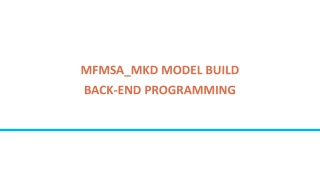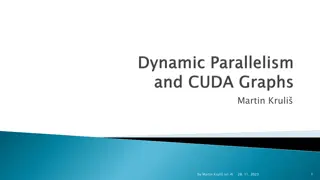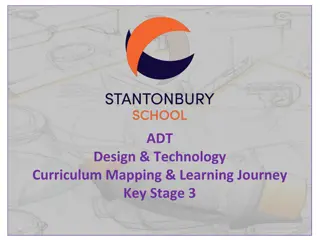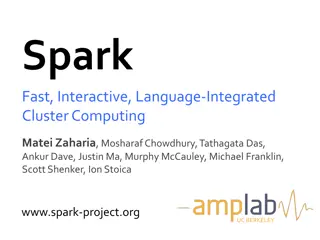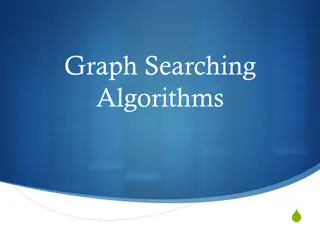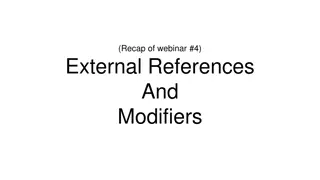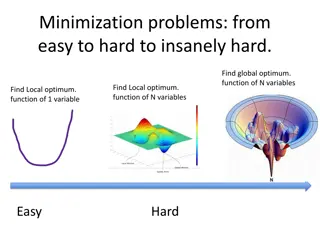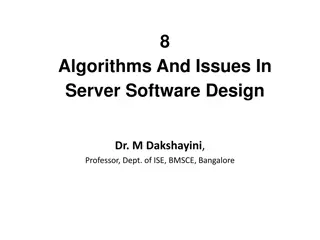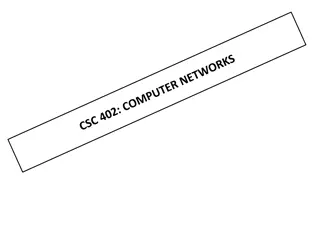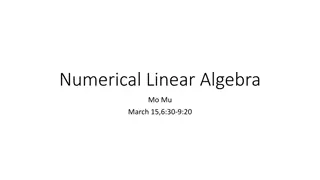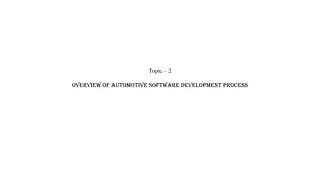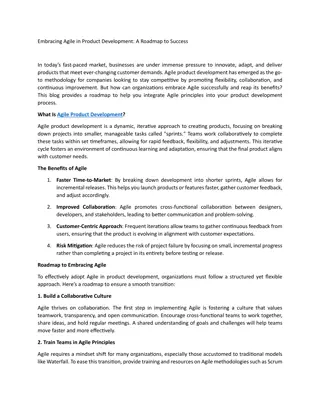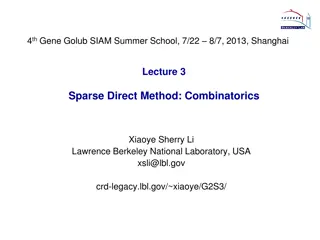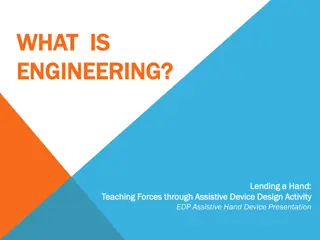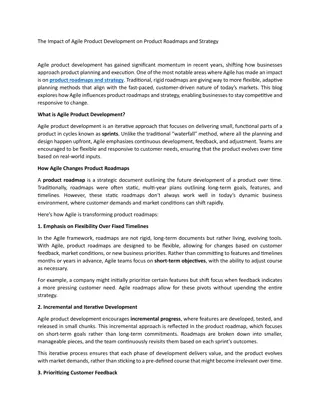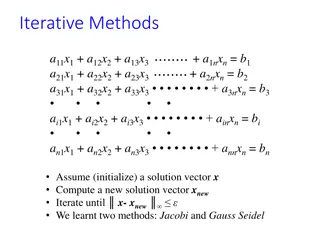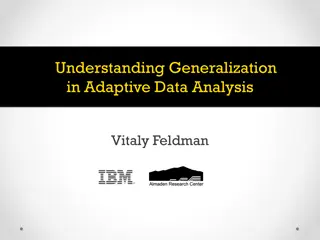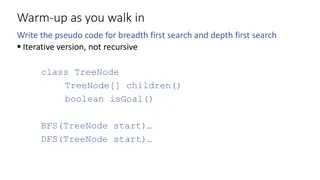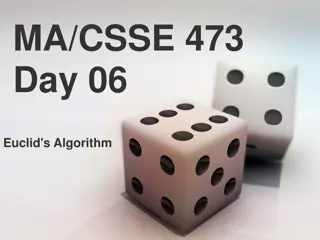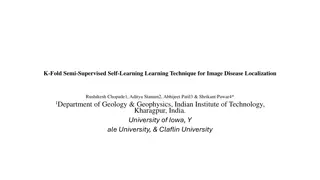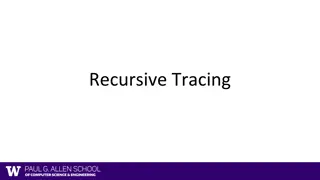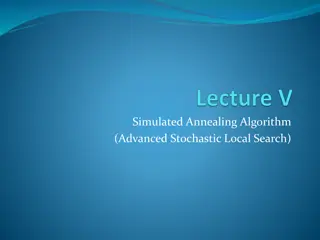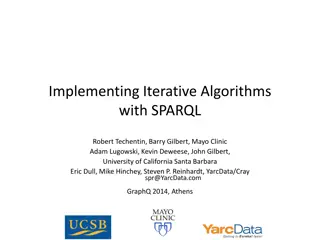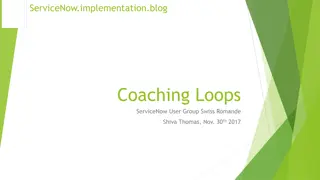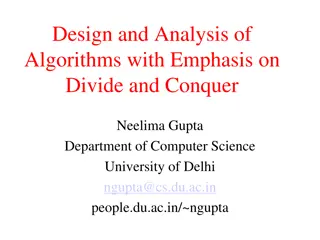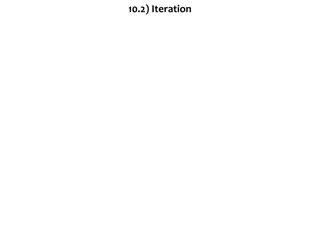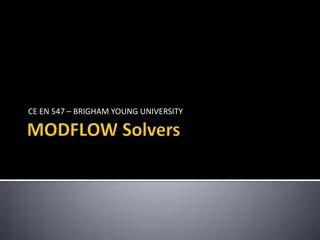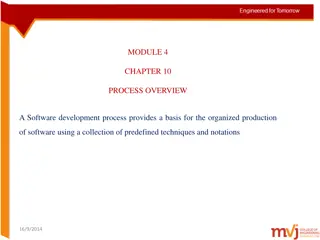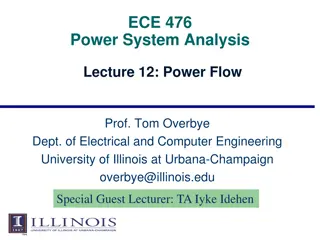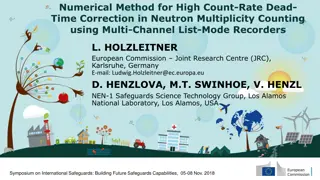Modern End-to-End Programming: Data Preparation, Model Building & Debugging
Prepare, build, debug models covering historical data. Make assumptions, solve equations, ensure data, economic consistency. Iterative processes for accurate simulations.
3 views • 10 slides
GCSE Design Technology Knowledge Organiser and Course Structure Overview
In this detailed knowledge organiser, find information about the GCSE Design Technology course structure, learning objectives, mission statement, and core technical principles for KS4 students. The course emphasizes iterative design cycles, creative thinking, problem-solving, and addressing environm
7 views • 53 slides
Understanding Parallelism in GPU Computing by Martin Kruli
This content delves into different types of parallelism in GPU computing, such as task parallelism and data parallelism, along with discussing unsuitable problems for GPUs and providing solutions like iterative kernel execution and mapping irregular structures to regular grids. The article also touc
1 views • 39 slides
Root Cause Analysis for Campaign Challenges
Root Cause Analysis (RCA) is a problem-solving method used to identify underlying causes of key process challenges in campaigns. It helps in learning from bottlenecks and successes to improve future outcomes. This analysis involves understanding what happened, why it happened, and what actions can b
7 views • 18 slides
Crafting Success How Effective Persona Creation Drives Design Success
Consagous Technologies UI UX Experts has ability to create experiences that resonate with users on a deep and personal level. Effective persona creation is the cornerstone of this success, enabling designers to understand their audience, guide design decisions, foster empathy, and drive iterative im
2 views • 2 slides
What is Email Marketing?
Email marketing is a cornerstone of digital marketing, leveraging targeted email communication to engage subscribers and drive desired outcomes. By crafting compelling content, personalized messages, and strategic segmentation, businesses can cultivate meaningful relationships with their audience. B
1 views • 7 slides
Design & Technology Learning Journey at Key Stage 3
Explore the ADT Design & Technology Curriculum Mapping and Learning Journey at Key Stage 3, focusing on the iterative design process. Dive into the essential concepts, skills, and experiences that students will encounter in this engaging educational pathway.
0 views • 26 slides
Understanding Apache Spark: Fast, Interactive, Cluster Computing
Apache Spark, developed by Matei Zaharia and team at UC Berkeley, aims to enhance cluster computing by supporting iterative algorithms, interactive data mining, and programmability through integration with Scala. The motivation behind Spark's Resilient Distributed Datasets (RDDs) is to efficiently r
0 views • 41 slides
Understanding Breadth-First Search (BFS) Algorithm for Graph Searching
This content delves into the Breadth-First Search (BFS) algorithm, a fundamental graph searching technique. It explains the step-by-step process of BFS, from initializing the graph to traversing vertices in a specific order. Through detailed visual representations, you will gain insights into how BF
1 views • 75 slides
Understanding External References and Modifiers in Provider Networks
Exploring the intricate details of external references, providers, and negotiated rates within provider networks. Learn about in-network files, iterative development, and the nuances of Medicare plans. Uncover the complexities of provider group IDs, negotiated prices, and in-network locations.
1 views • 28 slides
Binary Logistic Regression with SPSS – A Comprehensive Guide by Karl L. Wuensch
Explore the world of Binary Logistic Regression with SPSS through an instructional document provided by Karl L. Wuensch of East Carolina University. Understand when to use this regression model, its applications in research involving dichotomous variables, and the iterative maximum likelihood proced
0 views • 87 slides
Optimization Techniques for Minimization Problems
Explore various minimization problems, from easy to insanely hard, and learn about finding global and local optima using approaches like bisection, Newton's method, and rationalization. Discover efficient methods such as the golden section and iterative approximation with Newton's method for optimiz
0 views • 17 slides
Issues and Algorithms in Server Software Design
The content discusses fundamental issues in server software design such as connectionless vs. connection-oriented access, stateless vs. stateful applications, and iterative vs. concurrent server implementations. Various server algorithms like iterative and concurrent servers are explained with their
3 views • 44 slides
Understanding Means and LS Means Calculation in Statistics
Explanation of how means and least squares means (LS Means) are calculated in statistics. Describes the process of calculating means for different treatments and centers, as well as deriving LS Means through an iterative process, including handling empty cells.
1 views • 11 slides
Understanding Computer Networks and Servers
Computer networks are groups of connected computers that allow communication and resource sharing. They utilize network media, adapters, operating systems, and protocols. Servers are specialized network computers that provide centralized access to resources like applications, files, and email servic
1 views • 53 slides
Comprehensive Overview of Numerical Linear Algebra Methods for Solving Linear Systems
Explore numerical linear algebra techniques for solving linear systems of equations, including direct and iterative methods. Delve into topics like Gaussian elimination, LU factorization, band solvers, sparse solvers, iterative techniques, and more. Gain insights into basic iterative methods, error
6 views • 12 slides
Overview of Automotive Software Development Process
The development of software in the automotive industry is essential due to the increasing complexity of vehicles. This process involves requirements gathering, system design, component development, integration testing, validation, calibration, release, and maintenance. Automotive-specific considerat
0 views • 5 slides
Understanding the National Adaptation Plan (NAP) Process
Explore the conceptual understanding of the NAP process, highlighting its characteristics, importance for countries, and relation to other national processes. Learn about the objectives of NAP, its flexible and integrated nature, and the focus on reducing vulnerability and mainstreaming climate adap
0 views • 13 slides
Embracing Agile in Product Development A Roadmap to Success
Agile product development is a dynamic, iterative approach to creating products, focusing on breaking down projects into smaller, manageable tasks called \"sprints.\
0 views • 2 slides
Overview of Sparse Linear Solvers and Gaussian Elimination
Exploring Sparse Linear Solvers and Gaussian Elimination methods in solving systems of linear equations, emphasizing strategies, numerical stability considerations, and the unique approach of Sparse Gaussian Elimination. Topics include iterative and direct methods, factorization, matrix-vector multi
0 views • 35 slides
Understanding Engineering: Concepts and Processes
Engineering is the application of science, math, and technology to design solutions for everyday problems, benefiting society. The Engineering Design Process (EDP) involves defining problems, researching, brainstorming solutions, building prototypes, testing, communicating designs, and redesigning a
0 views • 28 slides
The Impact of Agile Product Development on Product Roadmaps and Strategy
Agile product development is an iterative approach that focuses on delivering small, functional parts of a product in cycles known as sprints.
0 views • 2 slides
Understanding Iterative Methods in Linear Algebra
Explore the concepts of iterative methods such as Jacobi and Gauss-Seidel for solving systems of linear equations iteratively. Understand conditions for convergence, rate of convergence, and ways to improve convergence speed. Delve into iterative schemes in matrix forms, convergence criteria, eigenv
0 views • 39 slides
Understanding Generalization in Adaptive Data Analysis by Vitaly Feldman
Adaptive data analysis involves techniques such as statistical inference, model complexity, stability, and generalization guarantees. It focuses on sequentially analyzing data with steps like exploratory analysis, feature selection, and model tuning. The approach emphasizes on avoiding hypothesis te
0 views • 25 slides
AI Search Algorithms: BFS and DFS Pseudo-code Iterative Version
Explore the iterative versions of Breadth First Search (BFS) and Depth First Search (DFS) with pseudo-code examples implemented for class TreeNode. Understand the concept of TreeNode, children() function, isGoal() method, and apply BFS and DFS starting from TreeNode start.
0 views • 53 slides
Understanding Euclid's Algorithm: An Ancient Approach to Finding Greatest Common Divisors
Euclid's Algorithm, dating back 2500 years, offers a simpler method to find the greatest common divisor (gcd) of two non-negative integers compared to traditional factorization. By iteratively applying a rule based on the gcd of remainders, it efficiently computes gcd values. The basis of the algori
0 views • 15 slides
Developing a 10-Year Strategy for Tamarack: Updated Approach and COVID Considerations
Developing a comprehensive 10-year strategy for Tamarack involves defining its vision, mission, strategies, governance, and business model. Key aspects such as strategic thinking, planning, and the impact of COVID-19 are considered in this iterative process with a focus on generating future scenario
1 views • 8 slides
Enhancing Image Disease Localization with K-Fold Semi-Supervised Self-Learning Technique
Utilizing a novel self-learning semi-supervised technique with k-fold iterative training for cardiomegaly localization from chest X-ray images showed significant improvement in validation loss and labeled dataset size. The model, based on a VGG-16 backbone, outperformed traditional methods, resultin
0 views • 5 slides
Iterative Feedback Framework for Prototype Improvement
The iterative feedback framework involves making sense of user feedback using the Keep, Chuck, Change, Create (KCCC) model to iterate and enhance prototype solutions. This process helps organize input from testing sessions, informing necessary modifications for better outcomes. The framework emphasi
1 views • 26 slides
Understanding Recursive and Iterative Factorials through Tracing
This content provides an in-depth exploration of recursive and iterative factorial functions through tracing examples. The explanations are accompanied by visual aids to help conceptualize the iterative and recursive processes of calculating factorials. By comparing the two methods side by side, rea
0 views • 7 slides
Understanding Simulated Annealing Algorithm: A Stochastic Local Search Approach
Simulated Annealing Algorithm is a powerful optimization technique that helps prevent getting stuck in local minima during iterative improvement. By accepting uphill moves, changing neighborhood structures, and modifying objective functions strategically, simulated annealing allows exploring a broad
0 views • 34 slides
Implementing Iterative Algorithms with SPARQL
This comprehensive guide explores the implementation of iterative algorithms with SPARQL, focusing on YarcData/Cray's approach to using these algorithms. It covers YarcData's interest in graphs, the Urika appliance, iterative algorithms in machine learning, implementation approach, and algorithms im
1 views • 12 slides
Understanding Coaching Loops for Improved Performance
Coaching loops are a method of enhancing performance by providing iterative feedback to guide individuals towards high performance. Unlike traditional feedback methods, coaching loops allow for real-time influence on the process outcome, improving overall effectiveness. By implementing the Kepner-Tr
0 views • 24 slides
Algorithms Design and Analysis with Divide and Conquer Approach
Explore the intricacies of algorithm design and analysis, with a focus on divide and conquer techniques. Delve into topics such as iterative and recursive algorithms, writing summations, divide and conquer strategy, and more. Discover how to compute large numbers, polynomials, perform searching and
1 views • 15 slides
Iterative Root Approximation Using Natural Logarithm
The content covers iterative root approximation using natural logarithm in solving equations. It explores finding roots by iterative formulas and demonstrates calculations to reach approximate values. The process involves selecting intervals to show correct values and ensuring continuity for accurat
0 views • 14 slides
Group Navigation with SQUID Technique
Utilize the SQUID technique from Gamestorming to systematically move through unknown information within a group setting. Start by writing the core topic on a sticky note and encourage participants to generate questions and answers, creating a directed series of inquiries. Through a structured proces
0 views • 6 slides
Understanding Iterative Solvers in MODFLOW
In this content, you will learn about the working of iterative solvers, solver parameters, troubleshooting convergence issues, and various solver algorithms in MODFLOW. The iterative tweaking of starting head values, different solver codes like SIP, PCG2, GMG, and their characteristics are explained
0 views • 21 slides
Software Development Process Overview
A software development process provides a structured approach for creating software using predefined techniques and stages such as system conception, analysis, system design, class design, implementation, testing, training, deployment, and maintenance. It involves stages like domain analysis, applic
0 views • 39 slides
Power System Analysis: Lecture on Power Flow
Lecture 12 on Power Flow Analysis in Power Systems covers the use of power balance equations when analyzing complex power consumption and generation. It explains the derivation of real power balance equations for iterative solutions in power flow analysis. The lecture highlights the need for iterati
0 views • 30 slides
Numerical Method for High Count-Rate Dead-Time Correction in Neutron Multiplicity Counting
Neutron detectors in safeguards utilize multi-channel list-mode recorders for advanced dead-time correction, improving data analysis. The method involves estimating lost pulses and correcting multiplicity histograms to enhance counting accuracy. Through an iterative process, dead-time probabilities
0 views • 6 slides
